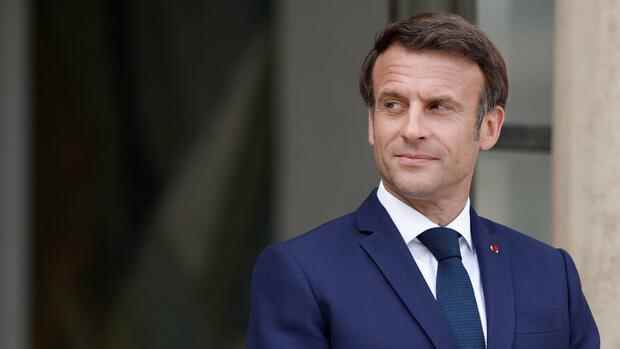The recently re-elected president had made the abolition of broadcasting fees a campaign issue.
(Photo: Reuters)
Paris It was an election campaign promise by Emmanuel Macron: the French President had promised to abolish broadcasting fees if he was re-elected. Now Macron’s new government wants to include the project in the next budget law.
The President presents the end of license fees as strengthening the purchasing power of the population in times of high inflation. Public media workers, on the other hand, fear that their income will collapse and that the variety of information in France will suffer.
Every household and every business premises in France that has a television has to pay a fee of 138 euros a year. There are exceptions for welfare recipients. The four public television stations and public radio services are largely financed with the most recent income of around 3.2 billion euros. The German-French TV channel Arte also receives money from the pot.
Just a few weeks after the presidential election, the cabinet decided to abolish broadcasting fees “permanently from this year”. The details are to be clarified in the new budget law that is currently being drawn up and is to be passed after the parliamentary elections in June.
Top jobs of the day
Find the best jobs now and
be notified by email.
The government in Paris emphasizes that the television and radio stations should not be privatized. The financing of public broadcasting will continue to be ensured “in accordance with the constitutional goal of pluralism and independent media”.
Unions call for strikes
Since the announcement in mid-May, resistance to the abolition has been growing. In a fire letter, four unions warn: “The prospect of a breakup in favor of the private media, where the billionaires rule, is unbearable.” The unionists called for a strike and a large-scale demonstration on June 28 in Paris. A statement from France Télévisions staff representatives said the end of broadcasts threatened “the very existence of public broadcasting”.
Even if broadcasters were funded from government budgets in the future, they would be subject to the whims of government and budgetary constraints. The French unions called for the German model to be used instead, in which the broadcasting fee is around 220 euros a year.
More Handelsblatt articles on Macron’s plans:
In the presidential election campaign, the right-wing nationalist Marine Le Pen and the right-wing candidate Éric Zemmour also had the abolition of broadcasting fees on their agenda. Unlike Macron, however, they did not want to compensate for the loss of income from the state treasury, but rather to completely privatize public broadcasting.
They seemed less concerned with strengthening purchasing power than with disliking journalists from the public channels who were allegedly left-leaning. Zemmour, for example, accused radio station France Inter of “propaganda” for LGBT issues and immigration during an interview.
On the other hand, there is criticism that the private news channels in particular give too much airtime to right-wing positions and make quotas with controversies. Zemmour, convicted of Islamophobic statements, had his own program on CNews before he decided to go into politics.
Private media in the hands of the super rich
In an interview with France Culture, communication scientist Alexis Lévrier from the University of Reims spoke of a “right-wing radicalization of private media”. In the early phase of the election campaign, some broadcasters gave in to the “wave of identitarian and xenophobic discourse”. “We’ve never talked about immigration and Islam as much as we have in these months,” Lévrier said.
CNews is owned by billionaire Vincent Bolloré, who also owns Canal+. Other French super-rich are also heavily involved in the media business: the empire of the construction and telecommunications entrepreneur Martin Bouygues includes the former public TV broadcaster TF1 and the news television LCI, while billionaire Patrick Drahi controls the news broadcaster BFMTV and the radio group RMC.
At a hearing in the French parliament in February, Drahi rejected the accusation that he wanted to influence the political agenda with his media involvement. “We don’t invest in the media to have influence, it’s rather an economic adventure and an extension of our activities,” said the entrepreneur, who also owns French mobile and internet provider SFR.
More: France’s economy is surprisingly shrinking – record inflation weighs on consumers
